
Will the South Korean version of Muji have anything on sale that you can’t get anywhere else?
Japanese homeware chain Muji currently has branches in 31 countries around the world, and is known and loved for its minimalistic “less is more” attitude to their products.
One country that Muji is particularly popular in is South Korea, where there are currently 39 branches of the store throughout the country. Our South Korea based reporter Soon Pyon’s is a fan of Muji, having frequented it during his time studying in Japan. But what does a South Korean Muji look like? Does the South Korean consumer base mean the kind of products on sale there are different? There was only one way to find out, so Soon Pyon’s headed to his nearest branch of Muji, located in Seoul’s IFC Mall.
The design and interior seemed to be exactly the same of that as Japan, and as he entered the store, he was met with the familiar scent and sounds of Muji.
Soon Pyon’s knew the products on offer at Muji differed from country to country, so he decided to start hunting for something uniquely South Korean.
Muji’s most popular products in Japan, like their curry and baumkuchen, had crossed the Sea of Japan and made it onto the shelves of this South Korean Muji.
Soon Pyon’s was happy to see Muji’s Banana Baumkuchen on the shelves as he is particularly fond of it, and though it’s slightly more expensive in South Korea than back in Japan (roughly 250 yen in South Korea vs. 150 yen in Japan), banana baumkuchen is kind of difficult to find in South Korea, so he was just grateful to be able to buy it at all.
The Japanese writing on all of the product labels wasn’t changed or covered up at all, so simply browsing the shelves made Soon Pyon’s feel like he was back in Japan.
This Muji had two floors, so he went to have a look what was available on the second floor.
It was the fashion corner! All of the same clothes that are sold in Japan were available here, but interestingly the clothing sizes went up as far as XXL, whereas back in Japan clothes tend to only get sold up to XL size.
Muji’s famous socks were also on sale, which was all well and good, but Soon Pyon’s still hadn’t found a product that was exclusively for the South Korean consumer base…
… until he came across the local produce corner, which is available in every Muji store in South Korea. The products here aren’t Muji products; rather, they are made by small companies from each region of the country chosen by Muji, and their products are sold at the stores. It’s like a mini exhibition of local produce, and very unique to South Korea!
Soon Pyon’s decided to get some Omiberry Berry Tea from the local produce area. It was sweet, tangy and delicious!
…but still, he hadn’t found any unique South Korean products with the Muji brand. He was about to give up and call it a day when…
… he finally found some!! There were three kinds of namul (Korean wild vegetables), two types of lentil rice and four kinds of instant soup.
Soon Pyon’s immediately noticed that, unlike all of Muji’s other products that have the usual Japanese packaging with a Korean translation sticker on the back, the writing on these packers was predominantly in Korean.
Soon Pyon’s decided to try one of the namul packets, rendered in English as ‘Savory Seasoned Korean wild Vegetable for Bibimbap’.
These were definitely products aimed specifically at a Korean market, and not just stuff imported from overseas for Muji fans. These were 100-percent Korean!
Soon Pyon’s mixed the namul with some rice and had a bite. It was delicious, with the aroma of sesame oil and just the right amount of saltiness. It had a mild taste, and was sure to be liked by even the most fussy of eaters.
So in the end, while most of the products on sale at Muji in South Korea are the same as those in Japan, there are a few that are uniquely South Korean. And with South Korea and France now both checked off our checklist of Mujis Around the World, here’s looking forward to the next trip to an international branch of Muji, wherever it may be!
Photos ©SoraNews24
● Want to hear about SoraNews24’s latest articles as soon as they’re published? Follow us on Facebook and Twitter!
[ Read in Japanese ]

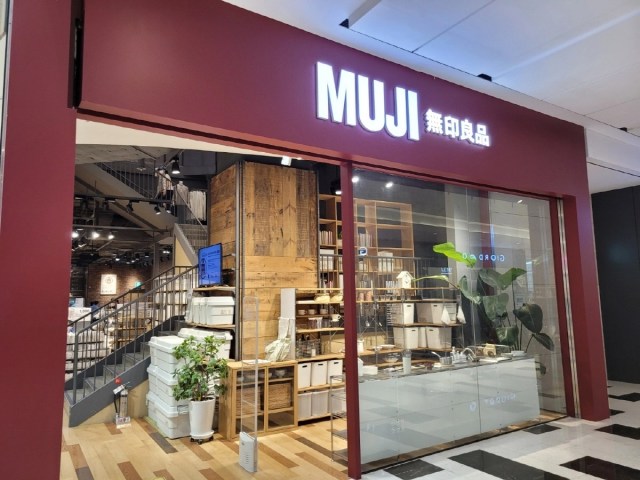
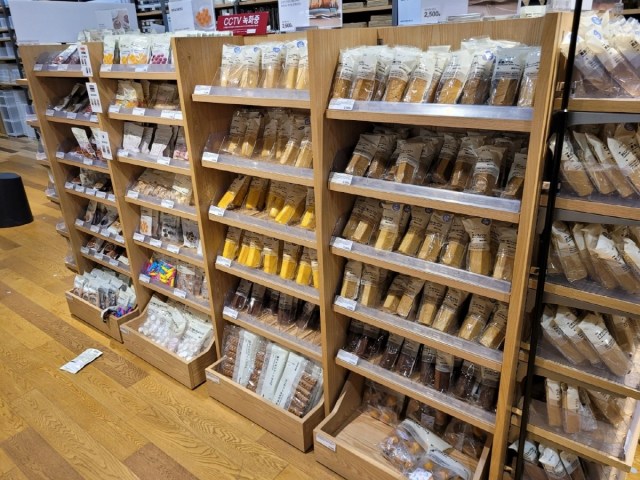
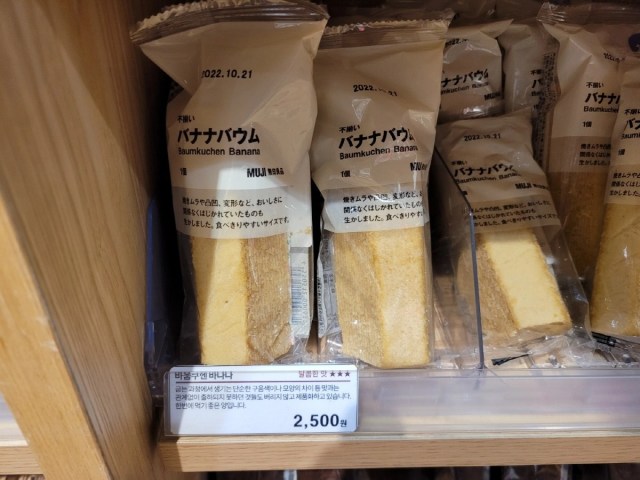
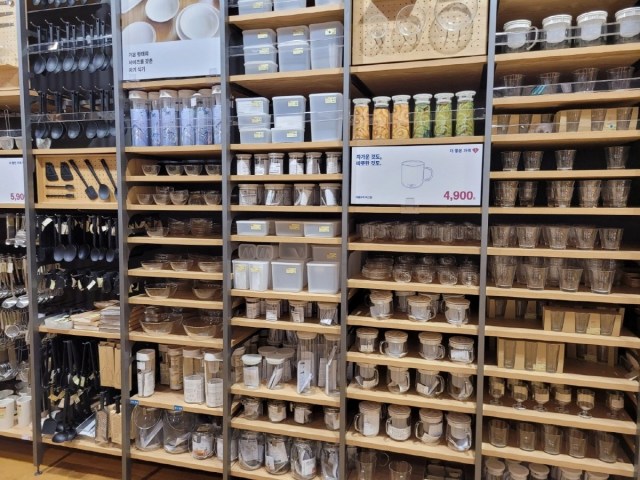
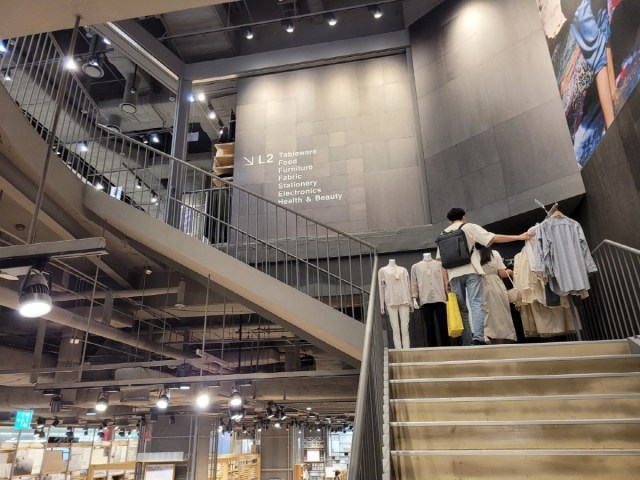


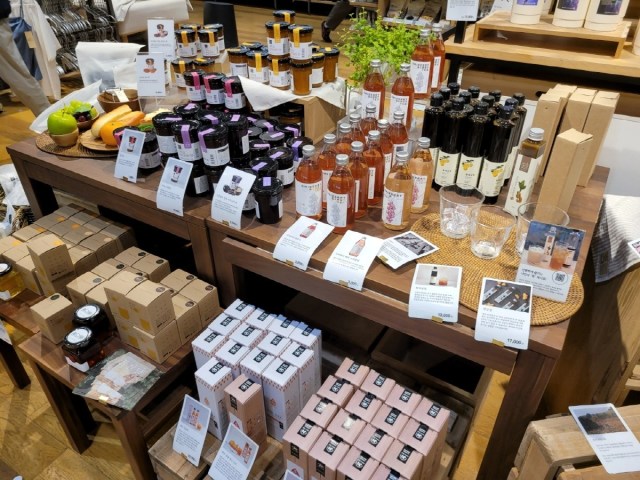
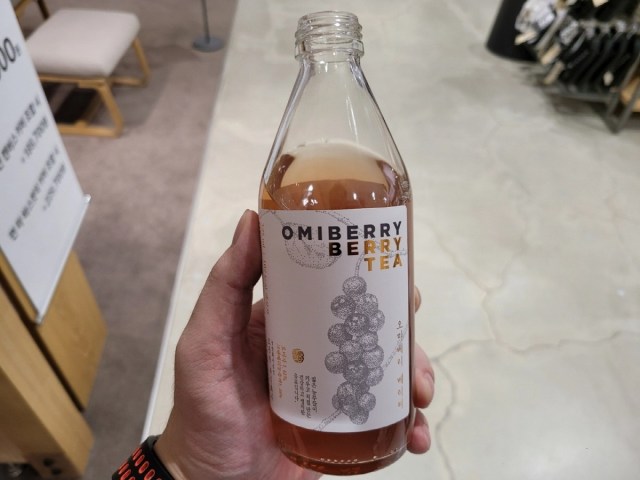
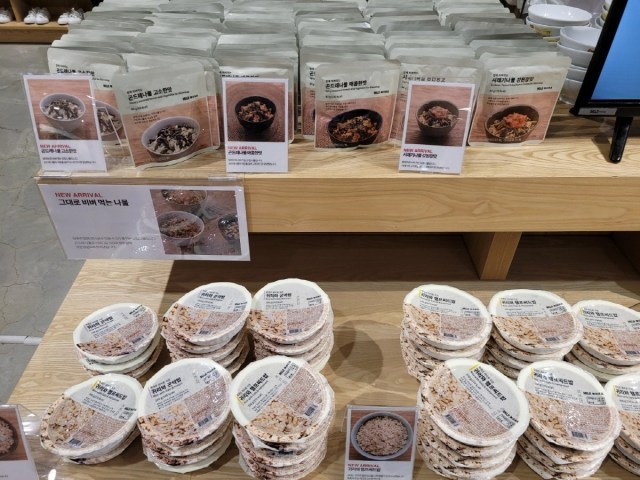
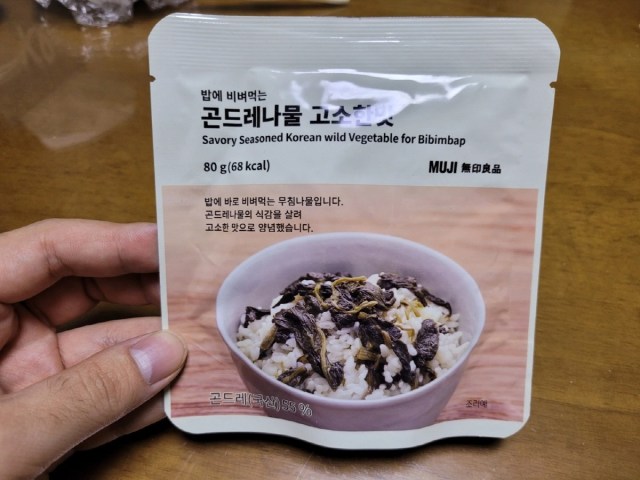
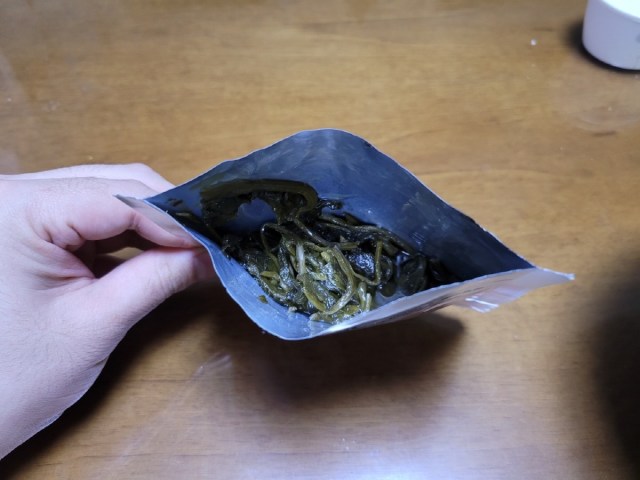
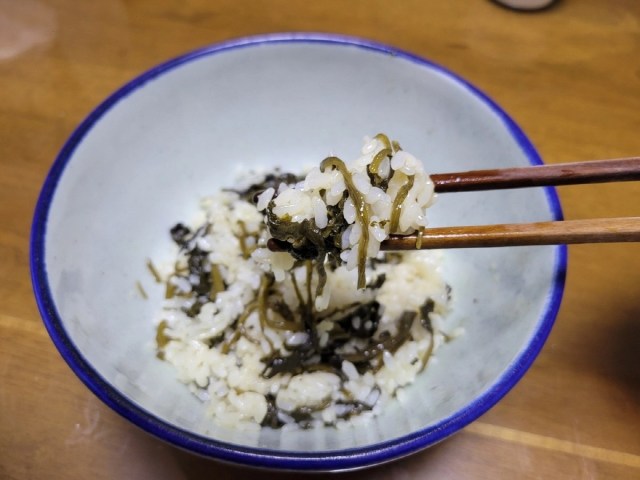
 KFC releases the Zinger Triple Down in Korea 【Taste Test】
KFC releases the Zinger Triple Down in Korea 【Taste Test】 We found a popular Japanese ramen chain in South Korea!…or so we thought
We found a popular Japanese ramen chain in South Korea!…or so we thought Muji flagship store in Tokyo’s Ginza reopens after renovation and puts the focus on food【Photos】
Muji flagship store in Tokyo’s Ginza reopens after renovation and puts the focus on food【Photos】 The world’s biggest Muji store opened in Hiroshima, and we went to check it out!
The world’s biggest Muji store opened in Hiroshima, and we went to check it out! What’s the best way to spend 1,000 yen at Muji Japan?
What’s the best way to spend 1,000 yen at Muji Japan? Japan’s new difficult-to-drink-from beer glass protects your liver, but it’s a brutal experience
Japan’s new difficult-to-drink-from beer glass protects your liver, but it’s a brutal experience New Pokémon ice cream, dessert drinks, and cool merch coming to Baskin-Robbins Japan【Pics】
New Pokémon ice cream, dessert drinks, and cool merch coming to Baskin-Robbins Japan【Pics】 New samurai glasses are Japan’s latest weird must-have souvenir
New samurai glasses are Japan’s latest weird must-have souvenir Demon Slayer: Kimetsu no Yaiba gets new roller coaster attractions and food at Universal Studios Japan
Demon Slayer: Kimetsu no Yaiba gets new roller coaster attractions and food at Universal Studios Japan How to order snacks on a Shinkansen bullet train in Japan
How to order snacks on a Shinkansen bullet train in Japan High-fashion Totoro cuddle purse is like an elegant stroll in the forest【Photos】
High-fashion Totoro cuddle purse is like an elegant stroll in the forest【Photos】 Kyoto Tower mascot termination reveals dark side behind cute Japanese characters
Kyoto Tower mascot termination reveals dark side behind cute Japanese characters Caffeinated ramen for gamers that you can eat with one hand going on sale in Japan
Caffeinated ramen for gamers that you can eat with one hand going on sale in Japan Burger King Japan suddenly adds Dr. Pepper and Dr. Pepper floats to its menu nationwide
Burger King Japan suddenly adds Dr. Pepper and Dr. Pepper floats to its menu nationwide Hello, cosmetics! Clinique teams up with Hello Kitty this summer for first-time collaboration
Hello, cosmetics! Clinique teams up with Hello Kitty this summer for first-time collaboration Nintendo history you can feel – Super NES, N64, and GameCube controllers become capsule toys
Nintendo history you can feel – Super NES, N64, and GameCube controllers become capsule toys “The most Delicious Cup Noodle in history” – Japan’s French Cup Noodle wins our heart【Taste test】
“The most Delicious Cup Noodle in history” – Japan’s French Cup Noodle wins our heart【Taste test】 Starbucks releases a cute Frappuccino and Unicorn Cake…but not in Japan
Starbucks releases a cute Frappuccino and Unicorn Cake…but not in Japan McDonald’s Japan’s Soft Twist Tower: A phantom ice cream only sold at select branches
McDonald’s Japan’s Soft Twist Tower: A phantom ice cream only sold at select branches Yabai Ramen: What makes this Japanese ramen so dangerous?
Yabai Ramen: What makes this Japanese ramen so dangerous? Finally! Nintendo Japan expands Switch 8-bit controller sales to everybody, Online member or not
Finally! Nintendo Japan expands Switch 8-bit controller sales to everybody, Online member or not Japanese government wants to build luxury resorts in all national parks for foreign tourists
Japanese government wants to build luxury resorts in all national parks for foreign tourists To combat declining birth rate, Japan to begin offering “Breeding Visas” to foreigners
To combat declining birth rate, Japan to begin offering “Breeding Visas” to foreigners 10 things you should buy at 7-Eleven in Japan
10 things you should buy at 7-Eleven in Japan Studio Ghibli releases anime heroine cosplay dresses that are super comfy to wear
Studio Ghibli releases anime heroine cosplay dresses that are super comfy to wear Woman charged for driving suitcase without a license in Osaka
Woman charged for driving suitcase without a license in Osaka Studio Ghibli unveils My Neighbour Totoro miniature house model
Studio Ghibli unveils My Neighbour Totoro miniature house model Kyoto experiencing problems with foreign tourists not paying for bus fares, but not on purpose
Kyoto experiencing problems with foreign tourists not paying for bus fares, but not on purpose Fighting mild hunger with a Japanese soda that turns into jelly in the stomach【Taste test】
Fighting mild hunger with a Japanese soda that turns into jelly in the stomach【Taste test】 Studio Ghibli’s Howl’s Moving Castle tapestry unveiled in Japan for first time
Studio Ghibli’s Howl’s Moving Castle tapestry unveiled in Japan for first time McDonald’s new Happy Meals offer up cute and practical Sanrio lifestyle goods
McDonald’s new Happy Meals offer up cute and practical Sanrio lifestyle goods Sales of Japan’s most convenient train ticket/shopping payment cards suspended indefinitely
Sales of Japan’s most convenient train ticket/shopping payment cards suspended indefinitely Sold-out Studio Ghibli desktop humidifiers are back so Totoro can help you through the dry season
Sold-out Studio Ghibli desktop humidifiers are back so Totoro can help you through the dry season Japanese government to make first change to romanization spelling rules since the 1950s
Japanese government to make first change to romanization spelling rules since the 1950s Foreigner’s request for help in Tokyo makes us sad for the state of society
Foreigner’s request for help in Tokyo makes us sad for the state of society Ghibli founders Toshio Suzuki and Hayao Miyazaki contribute to Japanese whisky Totoro label design
Ghibli founders Toshio Suzuki and Hayao Miyazaki contribute to Japanese whisky Totoro label design Doraemon found buried at sea as scene from 1993 anime becomes real life【Photos】
Doraemon found buried at sea as scene from 1993 anime becomes real life【Photos】 Tokyo’s most famous Starbucks is closed
Tokyo’s most famous Starbucks is closed Princesses, fruits, and blacksmiths: Study reveals the 30 most unusual family names in Japan
Princesses, fruits, and blacksmiths: Study reveals the 30 most unusual family names in Japan We try Muji’s new “communist” suit【Photos】
We try Muji’s new “communist” suit【Photos】 Japanese minimalist retailer Muji launches new set of disaster preparedness kits
Japanese minimalist retailer Muji launches new set of disaster preparedness kits Tour a stylish, minimalistic Muji House in new downtown Tokyo showroom
Tour a stylish, minimalistic Muji House in new downtown Tokyo showroom Get those gains and a protein boost with Muji’s newest, limited edition cricket crackers
Get those gains and a protein boost with Muji’s newest, limited edition cricket crackers Muji Ginza’s freshly baked bread is our new favorite thing
Muji Ginza’s freshly baked bread is our new favorite thing Get ready to take a seat on Muji’s new lightweight and easily portable Sofa Made from Air
Get ready to take a seat on Muji’s new lightweight and easily portable Sofa Made from Air Secret lunch spot in Tokyo’s Muji Hotel is a hidden gem that few people know about
Secret lunch spot in Tokyo’s Muji Hotel is a hidden gem that few people know about Muji adds Japanese haori samurai coats to their casual wear collection
Muji adds Japanese haori samurai coats to their casual wear collection Mujirushi’s Japanese micro-houses are finally on sale to the general public!
Mujirushi’s Japanese micro-houses are finally on sale to the general public! This super easy cold Korean spicy ramen dish will make summer 100 times more delicious
This super easy cold Korean spicy ramen dish will make summer 100 times more delicious Japanese interior brand Muji opening its first hotel ever in the heart of Tokyo
Japanese interior brand Muji opening its first hotel ever in the heart of Tokyo Internet reacts with confusion to Muji’s new fill-it-up-yourself water bottle product
Internet reacts with confusion to Muji’s new fill-it-up-yourself water bottle product What to buy at Daiso’s new Standard Products store in Tokyo
What to buy at Daiso’s new Standard Products store in Tokyo Muji opens its first prepared food-themed store in Higashi Ikebukuro
Muji opens its first prepared food-themed store in Higashi Ikebukuro Just how waterproof is this waterproof notebook? We put it to the test, SoraNews24 style
Just how waterproof is this waterproof notebook? We put it to the test, SoraNews24 style Tokyo’s Muji Hotel now taking reservations, ready to provide lifestyle-brand comfort to travelers
Tokyo’s Muji Hotel now taking reservations, ready to provide lifestyle-brand comfort to travelers
Leave a Reply